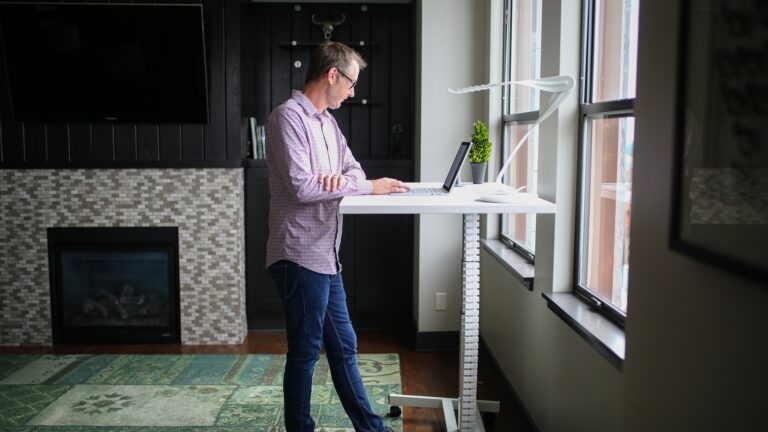You may have heard of mindfulness and the importance of relaxation and de-stressing during your day. But how do you do this when you’re in the office, or working from home? Meditating away from your desk may not be the best option, especially in front of co-workers. You might have meetings, phone calls and other distractions coming your way, as well as the job you actually need to do.
We’ve all had the feeling of being stressed or overwhelmed at work from time to time. Perhaps you’re demotivated, overworked, or overwhelmed with the volume of work you have to do. Linked to our motivation levels in work is the concept of mindfulness. This is our ability to remain present, focused and flexible in situations around us. It involves training the brain to think in a less stressful way about situations so that the thinking process becomes healthier.
You can do this at home while working remotely, or in the office. All it takes is a few tips and tricks to allow yourself to take a step back and refocus your mind so that you can continue staying productive.
So, how do you practice mindfulness during the workday so that you feel more present and productive? Here’s our guide on practicing mindfulness at work.
Benefits of mindfulness at work
According to Peak Wellness, a 2015 study by the American Psychological Association found that meditation in the workplace could improve productivity by 120%. In the study, employee absence fell by 85%, and workplace injuries dropped by 70%.1
There are many benefits of mindfulness at work. Let’s explore these in a little more detail.
It reduces stress
Many businesses are now starting to promote mindfulness as a way to combat stress. Stress is a key factor behind worker disengagement, and can really stop productivity levels in their tracks.
According to a study conducted by The European Agency for Safety and Health at Work, 80% of employees report that they feel stress at work, and 550 million working days are lost each year as a result of stress.2
This has led to companies such as Google, Adobe and General Mills introducing mindfulness programmes to promote relaxation and combat stress so that workers can balance their personal and professional lives more easily, and manage work-related stress with mindfulness techniques.
Your mind can take in new information more easily
When you let your brain relax and take a break from critical thought, you increase your capacity to take in new information, which helps with future learning and training. Skipping a lunch break for example can lead to stress and exhaustion, and can hamper productivity levels later in the day.
Your brain may feel zapped, and you may not be able to take in new information or deal with projects and tasks that require extensive amounts of focus. Exercising mindfulness during your day helps your brain to continue taking in new information.
Flexibility and adaptability
Being adaptable is important at work – it means that you can quickly cope with different situations and handle a range of demands and tasks. This is particularly important in leadership and management roles, and being present as a leader is very important to get the most out of your team. People who need to quickly and easily shift their priorities need to stay calm and focused, which mindfulness can help with.
You’ll be better at solving problems
When you problem-solve, you manage to get a clear solution to an issue whilst removing all the clutter around it. A clear and trained mind as a result of practicing mindfulness helps you to block out any distractions when trying to problem-solve, enabling you to process and unlock information in new and different ways.
Boosted creativity
Practicing mindfulness can enhance workplace creativity, helping you to look at things with a fresh perspective and a new direction. Because your brain is freed from distractions, it removes any clutter, allowing new ideas to come through in your thought processes.
Increased energy
Some days, you may feel like you’re running on very low energy. This is where mindfulness can help. Mindfulness can give you that energy boost needed to accomplish tasks and enjoy your work. Continuing to remain focused and calm is key to keeping your energy alive. If your goals are clear, you’re more likely to be able to work towards them successfully a positive attitude.
Improved empathy
Having a clear, calm and focused mind helps your social skills, so you can better understand others and where they’re coming from. Practicing mindfulness helps us to feel empathy for others and improves our general communication skills.
How to be more mindful at work
Here are several ways you can be more mindful and conscious at work, so you can perform at your best during the working day.
Do short mindfulness exercises during the work day
Mindfulness trains your brain to go into a mindful state, which helps your brain to function in a clearer way. In a busy office or working from home with distractions, finding time to do mindfulness can be difficult, but this doesn’t mean you should neglect your mental health.
Practicing mindfulness at work can be as short or as long as you want. Take just 10 minutes to try a deep breathing exercise at your desk. This will calm your stress levels, rebalance your nervous system, and will engage different and more creative parts of your brain.
Be present as much as you can
Being mindful is about being conscious and aware, rather than operating on auto-pilot in an unconscious mode. When you are mindful, you are more aware of your surroundings and what is going on around you in the moment.
Mindfulness is about being consciously present in what you’re doing, so you’re giving tasks your full attention. It can be simple to do, with a little brain training. While at work, every time your mind starts to wander and you think about a different topic other than your work, bring your brain back to the task you’re currently doing. Make a clear intention at the start of each work day to be as present as possible, and commit to it.
Set reminders to be mindful
It can be difficult to get into a ‘mindful’ mindset. This is because your brain is automatically programmed to become lost in thought. This is why you can always hear an internal voice. Doing things on autopilot can be the norm, and it is estimated that we spend almost half our day lost in our own heads.
If you’re constantly on auto-pilot, you’re not open and aware of the opportunities and situations around you. This means you can’t be creative or responsive, either. Set a vibrating alarm during your working day that doesn’t disturb others, and remind yourself to take some time to be mindful and breathe.
Close your eyes for a couple of minutes, imagine a calm scene like a forest or beach, and pause. When you open your eyes, be mindful of your surroundings.
Do one task at a time
In reality, no one can actually multi-task, as the brain can only focus on one thing at a time. When you try to multi-task, your brain switches from task to task so quickly that it often loses information in the process.
To stay mindful and on track with work, complete one task at a time and block out sections of time for when you’re working on a single job, and other times when you need to focus on two things. Make a note of what you achieved in the time that was blocked out.
Exercise gratitude
We’re automatically programmed to focus on the negative rather than the positive, which means that we have to carefully think of ways to balance our thinking. Actively being grateful for what you achieve, accomplish or receive in your life is a great way to turn negative thoughts into positivity.
Gratitude helps to make being at work a more positive experience. Start thinking about what you’re grateful for in your job. Maybe it’s a good salary? The people you work with? Think about how you can turn a negative into a positive. For example, office politics may be a bad thing, but it could end up teaching you what you don’t want in a future role if you were to move jobs.
Mindfulness tips for remote workers
If you work from home, it can be difficult to stay productive and on track, what with distractions from digital devices, pets, kids and other family members sharing the same space. Here are some tips on how to stay mindful if you work remotely.
1. Have a plan, and stay on track
Create a routine that you want to stick to for your working week at home, and stick to it, so that your mind and body get used to following a routine. Create time for people you need to speak to, wake up at the same time, and create a to-do list that keeps you motivated. As each task gets completed and you stay on track, this will give you a positive buzz.
2. Breathe
Take time to have a deep breath in and out at certain points of the day. This will help to slow your heart rate and ease your stress levels, so that you keep yourself in check.
3. Have a break
If you work from home, it’s all too easy to work into the evening, or take on another task as your working day blends into your personal life. Create strict boundaries between work and home life.
Go out for a walk and step away from your digital devices at lunch, and listen to your environment. Sit in your garden to get fresh air, or meditate for a few minutes in the afternoon. This will help you stay calm and focused throughout the day, which will enable you to feel more productive.
4. Block out distractions
When you are working from home with others sharing the same building, it can be challenging not to get distracted. Set up an organised and designated workspace that is solely for you. If you have children and other people, make sure they know the rules in terms of encroaching on your workspace. Plan activities with children accordingly so you won’t be disturbed. This will make for a calmer day.
5. Keep in touch
Find ways to stay social with your colleagues. Set up a team quiz, have a brief video chat, or try a new hobby outside of the home in which you can meet and interact with new people. Working from home can sometimes feel isolating, so make sure you’re staying connected with people in work and outside of work.
6. Try to focus on the positive
Don’t let negative thoughts and anxiety spiral out of control. If you are worried about something, speak up about it to someone who can help. Write positive notes to yourself on a sticky note, watch a funny pet video online, or listen to music. Do whatever you can to put yourself in a good mood for the day.





